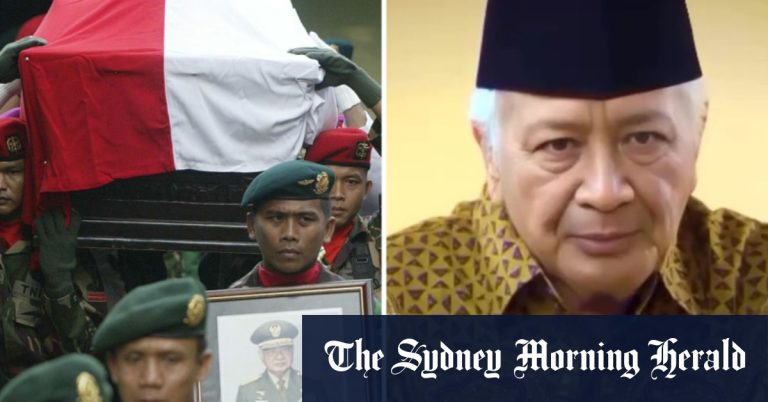Fake Suharto continues: “Since I took office, my dream has been to build a developed and prosperous Indonesia. The dream has been realized through the development of infrastructure such as highways and dams by great Indonesian engineers.
“President Jokowi [Widodo] President Susilo Bambang Yudhoyono has continued this important work. This proves that our dreams never die, but rather continue to live from generation to generation.
Fake Suharto goes on to say that he dreamed of Indonesia as a country where children would learn to be leaders in a technological world, where food prices were stable and affordable and where no one would die of hunger.
The man behind the “Back to the Future” election tactic is businessman Erwin Aksa, nephew of former Vice President Jusuf Kalla and deputy head of presidential candidate Prabowo Subianto's campaign team, a former special forces commando who was once Suharto's son-in-law.
Golkar does not have a presidential candidate of its own, but has declared its support for Subianto and his deputy Gebran Rakabuming Raka – Widodo's 36-year-old son – while aiming to secure 20 percent of seats in Indonesia's parliament.
download
The ruling political party during most of Suharto's 32-year control of the country, Golkar distanced itself from its leader for a long period after the collapse of his new regime in 1998, but has since re-embraced its authoritarian heritage.
“Personally, as a member of Golkar, I am very proud of it [Suharto] “Because it has succeeded in developing Indonesia,” said Aksa, who explained in his introduction to the social media creation that it was created using artificial intelligence.
“He has achieved a lot of successes. We must respect him, we must appreciate him, we must remember his services. Golkar was there.”
Evoking memories of past leaders is nothing new in Indonesian politics. The leading group in parliament, the Indonesian Democratic Struggle Party, has often promoted itself using an image of the country's first president, Sukarno.
But Suharto's regime was characterized by brutality, repression, and nepotism. While he oversaw rapid development, Suharto was forced to resign after a stunning economic collapse during the 1997 Asian financial crisis and a popular uprising known as the Reformation that led to widespread democratic reform.

Golkar was the dominant political party during Suharto's New Order regime. Here supporters attend a rally in Bali in 2004.credit: AP
Titi Anggraini is a member of the advisory team at Perludem, an Indonesian NGO that provides education and training in elections and democracy. She described Suharto's deepfake as “propaganda for practical electoral interests.”
“The case would be different if the AI quoted the actual words spoken by the former leader… [but] “It contains manipulation, and it is not correct information,” Angrini said.
“This could backfire on Golkar because for anti-New Order groups or pro-reform groups, Suharto’s AI system reinforces the perception that Golkar is the New Order party.
“However, this can also distort history. This is especially true for young voters between the ages of 17 and 23, who have not been exposed to reform struggles.

The front-runner in the presidential elections, Prabowo Subianto (right), and his deputy, Gibran Rakabuming Raka. Subianto was an army general under former President Suharto, who was supported by the army.credit: AP
Younger Indonesians are key to the 2024 elections. About half of those eligible to vote are under 40.
Amid allegations of human rights abuses under Suharto, the 72-year-old Subianto has made a visible effort to appeal to this generation in the presidential race, recasting himself as a friendly dance father and mostly holding off on the bombastic rhetoric of his previous unsuccessful outings. .
While the deepfake Suharto letters are not officially produced by Golkar, they are likely to reinforce the views of older Indonesians who still revere him, according to the executive director of the Indonesian Survey Institute, Jiyadi Hanan.
download
“I think he still has many followers. But the Suharto loyalists, both within Golkar and among Indonesian voters in general, are people born in the 1950s and 1960s and those born in the early 1970s.
“I think the use of Suharto AI will be enhanced [the opinions of] Some Golkar voters have nostalgic memories of Suharto's good old days. But they are not large in number.
At the same time, it awakens the negativity of public opinion towards Suharto, especially for the generation born in the mid-1970s and since then. People who grew up in the Reformation era… [they] Tends to be negative towards Suharto.

